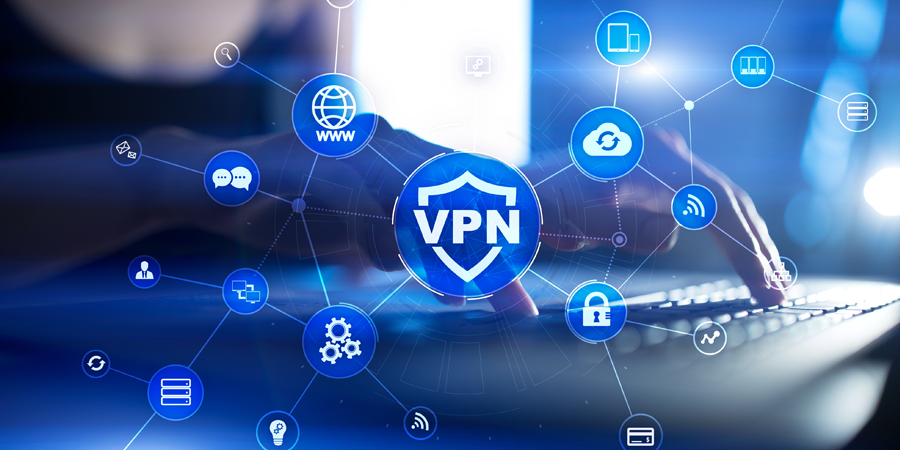A trustworthy virtual private network (VPN) is a good way to keep internet usage secure and private whether at home or on public Wi-Fi. Many users have long been familiar with various VPN services, which are necessary for the safe and free use of the internet without censorship restrictions. However, not all users who use VPN to unblock sites, know that some services cannot provide a high level of security on the internet. A VPN will navigate the information through a secure “tunnel” to hide them and encrypt communication travelling from and to the user’s device. However, a flaw in VPN encryption not only makes the VPN connection weak but also reduces the user's security and causes leaks.
Leaks: what are they and how do they occur
When configuring the VPN service, some mistakes can happen and, as a result, the user encounters data and/or IP addresses leakage even when he is connected to the VPN. The user’s real IP address becomes visible, even though he’s using a VPN, which is intended to mask the true IP address and help protect his online privacy.
VPN leaks may be more common than one might expect. A 2016 study found that 84 percent of Android free VPN apps tested by researchers leaked users’ IP addresses.
An IP address identifies the connection of the device used to the internet and its location. A leaked IP address could allow the user’s online actions to be traced back to him. He might choose to hide his IP address for a variety of reasons, including safety and privacy.
Leaks occur most often in one of three ways:
- WebRTC leaks
WebRTC vulnerability is a network issue where attackers as hackers, government agencies, internet service providers, and others can track the user’s data and browsing history. The user’s true IP address is exposed through his browser’s WebRTC functionality. Browsers such as Firefox, Chrome, and Opera allow WebRTC by default. However, Internet Explorer and Safari will not enable WebRTC until you enable it yourself. Using Chrome and Opera, you should install the Chrome Web and ScriptSafe add-on in your browser. It can be installed in the Opera browser and disable WebRTC.
When exposed, it is essential to check the VPN connection and take measures to ensure confidentiality to prevent any barriers to using your favorite services, such as Netflix, BitTorrent, or any other streaming service.
- DNS leaks
DNS (Domain Name System) are responsible of translating website names into IP addresses that identify specific websites. Leaks in such places will make the user’s true IP address unprotected when the DNS request is either sent unencrypted outside the VPN used or when the VPN server somehow is bypassed. Often, a DNS VPN leak is due to improper configuration of the network settings.
- Browser extension VPN leaks
Browsers have a function that enables quicker and more efficient searches called “prefetching”. However, this function exposes the user to reduced privacy and security through VPN leaking. Browser-extension VPN leaks happen when Chrome VPN extensions “prefetch” a domain name by predicting what websites the user is going to visit to speed up connections.
However, there are some steps one can take to test whether there’s a browser extension VPN leak:
- Activate the Chrome plugin on your VPN.
- Go to chrome://net-internals/#dns and click on “clear host cache.”
- Then go to any website to confirm the leak.
In addition, one can stop the leak by following these steps:
- Go to Chrome://settings in your address bar.
- Next go to “Search settings” and type in “predict.”
- Then disable the options “Use a prediction service to help complete searches and URLs typed in the address bar” and “Use a prediction service to load pages more quickly.”
What to do if a data leak is detected?
If you find data leaks, contact the technical support of your VPN service and try to solve the problem with the help of specialists. Be aware that VPN advertising is often targeted at inexperienced users who might fall for marketing tricks. Therefore, as an option, you can simply start using the services of a high-quality VPN service, which does not allow data to leak to the side.
Nevertheless, for a more convenient connection to a VPN network, several companies in the market offer their branded VPN clients. The danger may be the lack of encryption of the process of obtaining configuration files and keys. As a result, keys and configuration files can be intercepted by hackers and used to decrypt all internet traffic. Many services practice the distribution of one key to all servers and users with a difference in the authorization process by login and password. In the case of hacked login and password, the intercepted key will allow you to decrypt all internet traffic of the user.
Some companies use different encryption keys for each user, but still with the same key for all servers. Only an individual key for each user and server can provide reliable protection. Thus, if user keys on one server are compromised, then connecting to another server will remain secure.
Who needs a VPN?
Technically, everyone can benefit from using a VPN to keep their information safe. However, some people may find the need of using one more binding than others.
Most of all, frequent streamers should consider using a VPN. This is because streaming networks are typically used for hours on end, which tends to quickly drain your data over time. By purchasing a VPN, you will be able to stream these services as much as you want, without worrying about how it will affect your mobile data. Another type of people are the frequent flyers: cybersecurity is always an issue for people who live on a plane. Therefore, if you travel frequently and often use your computer and/or mobile phone to conduct business or communicate with your friends and family, you should consider purchasing a VPN to protect your information as you use various networks across the globe. Thirdly, we almost never find a frequent Torrent user without his VPN connection. If one uses BitTorrent on a regular basis, as a way to share and receive information and data, he needs to purchase a VPN to protect his information from hackers and hazardous software. Last but not least, to those who prefer privacy, a VPN will allow them to be free to surf the web without worrying about the wrong parties finding ways to uncover personal information.







